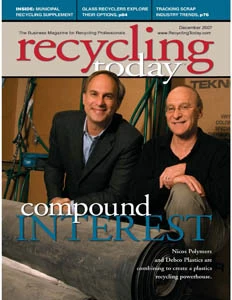Exports of plastic scrap to India will be "severely affected" by new E.U. shipment regulations, Bureau of International Recycling (BIR) Plastics Committee Chairman Surendra Borad of Gemini Corp. NV, Belgium, warned attendees of the BIR Autumn Round-table, held in Warsaw, Poland, Oct. 22 to 23.
India has been "very ambiguous" in its response to the E.U., resulting in the implementation of a notification system, he said. "When free trade is put under regulations, there are bound to be distortions," Borad added.
Presently, he said, approximately 7,000 metric tons of plastics scrap, mainly LDPE, but also PET, is being exported to India each month.
European exporters have also been hit by a 200 percent to 300 percent increase in freight for ocean-going shipments, which is proving "difficult to bear for the plastics market." Taking into account the strength of the Euro, Borad said, "I strongly believe that the volume of international trade in our industry will be reduced substantially during this period."
Jacques Musa, Veolia Proprete France Recycling, noted that E.U. regulations, sea freight increases and CCIC (China Certification and Inspection Co.) controls have also had a significant effect on exports to China. "Sea freights have been increased by two to three times for shipping to China, but prices are not definitely finalized," he said. "Let’s hope that rises will be contained—otherwise, low-price material will be difficult to export."
Import taxes and inland transportation costs in China have also climbed, he added.
Export issues also preoccupied Peter Daalder of Daly Plastics BV in the Netherlands and Marc Figueras of Veolia Propreté France Recycling. The former complained of the scale and cost of environmental and customs checks carried out at Dutch ports, while the latter suggested that delays caused by the "rigidity" of export authority checks in Spain are threatening to "paralyze" container movements.
A report on the plastics market in Australia given by Fred Jiang of Sims Group confirmed that 281,000 metric tons of secondary plastics had been reprocessed domestically in 2006, a "significant increase" compared to 2005
A perspective on plastics recycling in Poland was provided by guest speaker Maciej Krzyckowski, manager of the recycling department of Eko Cykl Recovery Organization Inc. Expressing confidence in his country’s ability to meet E.U. plastics recovery and recycling targets, Krzyckowski revealed that about 64 percent of domestic scrap is subjected to materials recycling, 33 percent to energy recovery and 3 percent to chemical recycling. According to the Polish authorities, plastics are not deemed to have been recycled until regranulate has been turned into a new product, he added.
Largest U.K. Plastics Recycling Plant OpensIntercontinental Recycling Limited (IRL) has opened a multi-million-pound plastics recycling plant at its site in Skelmersdale, Lancashire, U.K.
The facility, which has received more than £500,000 in funding from Alliance & Leicester Commercial Bank, will be able to process approximately 30,000 tons of post-consumer plastic bottles per year into recycled PET flakes and HDPE pellets.
The plant’s technology will allow it to run mixed plastics through its sorting and separation systems, creating a viable alternative to export for U.K. companies, according to IRL.
More information on the investment is available at www.alliance-leicestercommercialbank.co.uk.

Explore the December 2007 Issue
Check out more from this issue and find your next story to read.
Latest from Recycling Today
- IDTechEx sees electric-powered construction equipment growth
- Global steel output recedes in November
- Fitch Ratings sees reasons for steel optimism in 2025
- P+PB adds new board members
- BlueScope, BHP & Rio Tinto select site for electric smelting furnace pilot plant
- Magnomer joins Canada Plastics Pact
- Out of touch with reality
- Electra names new CFO





